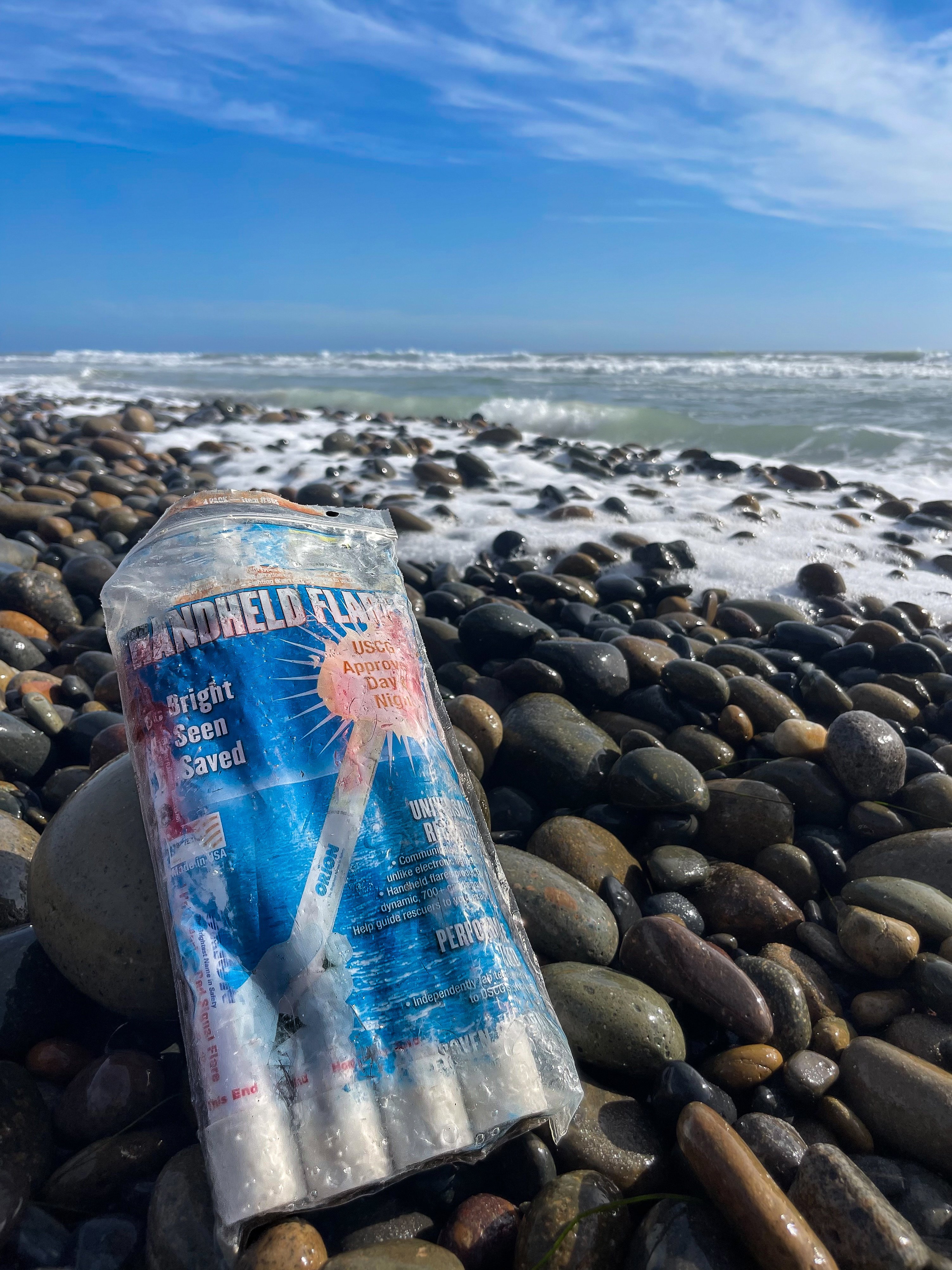
Expired marine flares may seem harmless enough, but they are actually hazardous explosives. Currently, not a single facility in California accepts them. The gap in disposal options must be addressed; a legislative fix exists.
A Story Without an Ending
While cleaning the beach last winter, I came across a four-pack of expired marine flares. At the time, I didn’t think much of it. Over the years, I’ve found many unusual things on San Diego County beaches — a package of flares wasn’t at all surprising. People lose things at sea all the time. Flares probably fall overboard accidentally or are tossed into the ocean on purpose. I put them in my bag of beach litter and continued on my way.

Expired Marine Flares found on the beach in Carlsbad
A Disposal Dead End
Once at home, it occurred to me that marine flares probably shouldn’t go to the landfill, so I asked my husband to take them to our local hazardous waste facility. I was surprised and confused when they wouldn’t accept them. If the hazardous waste facility wouldn’t take marine flares, who would?
On the advice of a friend, I started calling around. The sheriff’s station referred me to the fire department, who told me to call the fire inspector. I left a message but didn’t get a call back.
A few days later, while walking at the beach, I ran into a California State Parks Ranger. I asked if he knew how to dispose of marine flares. He didn’t. In fact, he said he had expired flares in his garage and wasn’t sure what he should do with them. He suggested trying Marine West, a local retailer that sells boating supplies and fishing gear.
I stopped by Marine West the following week. I confirmed that they sell flares, but when I asked if they take back expired ones, the employee shook his head and said, “We don’t deal with hazardous waste.”
 Flare display at Marine West in Oceanside
Flare display at Marine West in Oceanside
Hazardous Waste With Nowhere to Go
Despite being toxic explosives, it’s impossible to legally dispose of marine flares in San Diego County. In fact, unless you live in Alameda County, the only county in California that regularly offers marine flare disposal for their residents, you’re out of luck.
Until recently, collection events funded by grants were held occasionally in beach communities across the state, but no new events have been scheduled. For now, San Diegans—and virtually all Californians—are left hoping for a special drop-off event near them that may never happen.
This leaves boaters and beachgoers like me without an option, which is troubling. Over time, the chemicals in flares can become unstable, increasing the risk of accidental ignition or explosion. When discarded improperly, they can cause injuries, fires, or toxic environmental pollution.
Without alternatives, some people resort to illegal and dangerous disposal: tossing flares into the ocean, putting them in their curbside trash bin, hiding them in boxes of acceptable household hazardous waste, leaving them anonymously at fire or police stations, or storing them indefinitely at home or on their vessels.
A Legislative Fix
Thankfully, California State Senator Catherine Blakespear — who represents southern Orange County and northern San Diego County, where I live — has introduced Senate Bill 561: Hazardous Waste: Emergency Distress Flare Safe Disposal Act.
When I first heard about the bill, I shared my story with Senator Blakespear's office, and Dr. Nadia Mahallati, her policy analyst, confirmed that I had encountered the problem SB 561 was designed to address.
If passed, SB 561 will require marine flare manufacturers to take responsibility for the safe collection and disposal of their products. The bill will also mandate education and outreach efforts, including signage at marinas and retailers.
I’m Stuck—For Now
Until SB 561 is enacted, I’m stuck with the expired flares, and I know I’m not alone! In California, approximately 174,000 marine flares expire each year with nowhere to go.
If you’ve faced this issue — or even if you haven’t, but support producer responsibility and cleaner, safer coastlines — I urge you to call or email your state representatives and ask them to support SB 561.
Resources:
- Senate Bill 561: Hazardous Waste: Emergency Distress Flare Safe Disposal Act.
- Find your California Representatives
- Sign the Coalition Support Letter (for organizations)
- Marine Flare Fact Sheet
- Guide to Marine Flare Management in California

